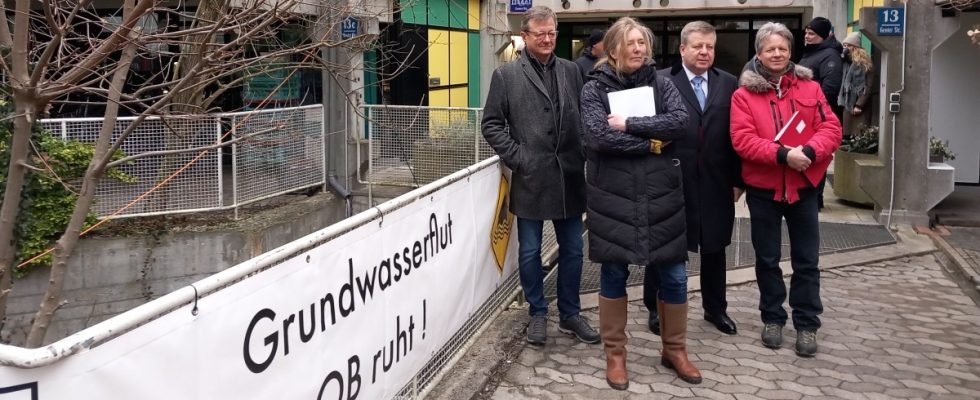Groundwater has been flowing continuously into the cellars and garages of Genter Straße 13 a to 13 f in Schwabing for three and a half years. Now pumps are finally being installed. Pumps that are supposed to help get the water out of the listed houses built in 1972 by architect Otto Steidle. This could be a small Christmas present for the residents, but the water is now just one of their problems. Now there are others: immensely high sewage charges and a broken heating system.
Why the water gets into the cellars is the big and crucial question that has long been disputed between the city’s Department for Environment and Climate Protection (RKU), the Munich City Drainage Department (MSE) and the residents. The environmental committee of the Bavarian state parliament, the state government and the district committee agree with the residents who see the city of Munich as having a duty. Reports carried out over the last three and a half years have also confirmed that the storm drain (RAK), which was built in 1987 and runs alongside the houses, is damming up groundwater. However, the city of Munich claims that the refilling of Kleinhesseloher See with water in 2020 is the cause and refuses to help the residents.
The two pumps are therefore not financed by the city, but by the Ministry of Science of the Free State of Bavaria. 160,000 euros were initially released to ensure that a “monument does not finally collapse,” as the state parliament member and chairman of the science committee, Robert Brannekämper (CSU), says.
The pumps will probably only be able to go into operation at the end of January, says Franziska von Gagern, spokeswoman for the Groundwater Interest Group (IG). But she is happy that “someone is finally helping us.” The homeowner still can’t be really happy. Because in November a notice from the Munich city drainage system came through: residents should pay 31,000 euros in sewage fees.
For years you can hear the splashing in the house’s former swimming pool, and for years residents have been trying to get the water out of the basement, the former swimming pool and the underground car park with their own house lifting system. It runs continuously. “And now we have to pay this amount?” Gagern is stunned. Because this demand is not enough. They would then receive another 200,00 euros by 2024. She objected. The residents will not pay. Especially since the city council decided in the summer of 2020 to suspend the payment request until the matter was clarified, says Gagern. But there can be no question of clarification.
Another problem: the heating in the houses has been in one of the damp rooms for a long time. Heating installers always warned about the moisture and no longer wanted to service the heating. Now the system doesn’t work at all. A mobile heater has been standing in the garden of the affected houses for weeks. “That costs huge amounts of money,” says Gagern, and a new heating system costs 100,000 euros. But you couldn’t install them as long as the cellars were damp.
The increased groundwater has led to basement flooding for three and a half years.
(Photo: Catherina Hess)
“Leaving people out in the cold, but sending notices of wastewater charges” – that is unacceptable, state parliament members Christian Hierneis (Greens), Robert Brannekämper and IG lawyer Benno Ziegler agreed at a press conference with residents of Genter Strasse. All three are calling on the city of Munich and in particular Mayor Dieter Reiter (SPD) to make Genter Strasse a “top priority”.
The IG submitted a petition to the Bavarian state parliament three years ago. The MPs unanimously supported the residents. Genter Strasse was discussed several times in the state parliament’s environmental committee. Again and again calling on the city of Munich to finally act. The IG is now expanding its petition to include the demand that the state government be asked, through the government of Upper Bavaria, to oblige the city of Munich, i.e. the MSE, to comply with the decision of November 15, 2023 on wastewater fees and all other decisions for the years 2020 to 2024, which are still to be expected.
Construction work on the pump wells on Genter Straße began two weeks ago. “The effort is huge,” says Gagern. From their point of view, it would have been better if the city had arranged for the groundwater to be fed in via the storm drain as requested by the IG right from the start. Nevertheless, the new pumps are an “initial relief”. But by no means a long-term solution. She can only describe the fact that after three and a half years we are fighting against something that was so obvious as absurd. “I’m exhausted,” says Gagern. Their fight and the fight of all residents drain their strength and their health. “But we won’t give up,” she says.

